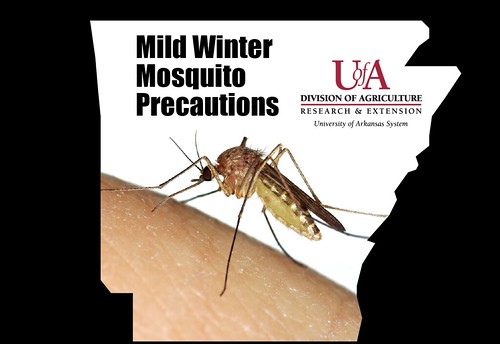Take anti-mosquito precautions during warm winter
By the UofA System Division of Agriculture
Feb. 14, 2017
Fast Facts:
- Warm weather giving mosquitoes a head start
- Use repellents, drain standing water to protect home, self
(314 words)
(Newsrooms: with file art of mosquitoes at https://flic.kr/p/81PKhB)
LITTLE ROCK – If you find yourself doing a little more scratching this time of year, it could be that those pesky biting insects associated with warmer days are already sinking their proboscises into you.
According to the National Weather Service at Little Rock, Arkansas saw record temperatures in both January and February. Seventeen record highs were broken or tied on Jan. 10-12 or Jan. 31. Average temperatures for early February were running about 8 degrees above normal. From Feb. 1-11, Fort Smith saw the highest departure, coming in at 9.9 degrees above average. Feb. 11 saw record highs of 85 degrees at Fort Smith and 84 degrees at Harrison.
“Our current mild winter and recent unseasonably warm temperatures are beginning to make overwintering mosquitoes restless,” said John Hopkins, extension entomologist with the University of Arkansas System Division of Agriculture. “The probability of an early awakening will give the mosquito population a head-start toward building higher population levels later in the season.”
To help minimize the aggravation and potential disease threat from these biting insects, Hopkins advised taking actions that most people would normally do during the rainy spring:
Regularly drain standing water, including water collecting in empty cans, tires, buckets, clogged rain gutters and saucers under potted plants.
When it comes to protecting yourself outside, use a repellent – being sure to read the active ingredient list and closely follow label directions.
“When mosquitoes are present, wear long-sleeved clothing and protect yourself with an insect repellent that contains DEET, picaridin, IR3535, oil of lemon eucalyptus, or para-menthane-diol,” he said.
“Finally, make sure door, porch and window screens are in good condition to prevent mosquitoes from entering your home,” Hopkins said.
Download the publication “Mosquito Control Around the Home and in Communities,” FSA7059 at http://www.uaex.uada.edu/publications/pdf/FSA-7059.pdf
For more information about insects, contact your county extension office or visit www.uaex.uada.edu.
The University of Arkansas System Division of Agriculture is an equal opportunity institution. If you require a reasonable accommodation to participate or need materials in another format, please contact the Sebastian County Extension Office as soon as possible. Dial 711 for Arkansas Relay.
# # #
Media Contact: Mary Hightower
Dir. of Communication Services
U of A Division of Agriculture
Cooperative Extension Service
(501) 671-2126
mhightower@uada.edu
Related Links
